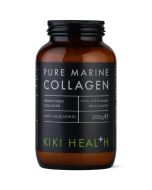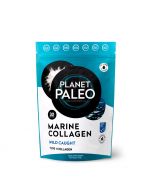
Benefits of taking collagen at night
Taking collagen in the evening can harmonise with the body’s nightly repair cycle: it may support skin elasticity and hydration, aid post-exercise muscle recovery, and the glycine it contains can help promote more restful sleep. Evidence is strongest for overall collagen benefits (skin and connective tissue) and for pre-sleep protein aiding overnight muscle repair; timing specifically to “night” is a reasonable strategy for routine and sleep support, but consistency matters most.
“Collagen in the evening is a simple, low-effort habit that aligns with your circadian rhythm when you sleep while its amino acids get to work on skin and connective tissues.” explains Mitesh Desai, Nutritionist at Landy’s Chemist.
Why collagen at night is beneficial
Supports bone repair: Bone resorption markers naturally peak overnight, while collagen peptides taken consistently have been shown to improve bone mineral density in postmenopausal women. Night-time intake may therefore coincide with a period of high skeletal remodelling, although timing-specific trials are still lacking.
Supports sleep onset: Glycine, abundant in collagen, has documented hypothermic effects that reduce core body temperature and can promote smoother sleep initiation and better next-day performance.
Works with pre-sleep protein for recovery: Research on pre-sleep protein shows neutral effects on next-morning appetite and resting energy expenditure, making an evening serving a practical way to raise daily protein without adverse next-day effects. Evidence is mainly from casein studies rather than collagen, so consider this a protein-timing principle.
Boosts connective tissue recovery after evening training: If you train late afternoon or evening, taking collagen or gelatin with vitamin C 30 to 60 minutes before loading has been shown to increase collagen synthesis in tendons and ligaments. For evening sessions this stacks neatly with the night period.
Skin follows a circadian programme: Your skin has a body clock, known as circadian oscillations. At night it switches from daytime defence to repair and renewal, with more cell turnover and blood flow. Taking collagen in the evening simply fits this schedule, supplying building blocks while your skin is naturally doing its maintenance.
There is strong evidence for collagen’s benefits on skin appearance, joint comfort and bone health when used daily. There is also mechanistic and clinical support for glycine aiding sleep quality. Specific proof that night is superior to morning is limited, so choose the time you can stick to. Reported benefits such as nail strength and reduced osteoarthritis symptoms have support in trials, though they are not tied to night-time dosing and more research on timing is needed.
How to take collagen at night (simple guide)
- Dose: 2.5–10 g hydrolysed collagen (powder, liquid ampoule or capsules) about 30–60 minutes before bed
- With or without food: Many take it on an empty stomach for convenience; the key is daily consistency
- Stack smart: Pair with vitamin C, which contributes to normal collagen formation (EFSA-approved claim) e.g., a small glass of vitamin-C-rich juice or a supplement earlier in the day
- Hydration: Mix powder with water or a caffeine-free warm drink
Choosing your collagen
Does the type matter?
Yes, but mostly by collagen type rather than animal source. For skin, hair and nails, trials show hydrolysed collagen peptides improve hydration, elasticity and fine lines. These products are typically rich in type I and type III, which dominate in skin.For joint comfort in osteoarthritis, undenatured type II collagen (a different ingredient to hydrolysed peptides) has supportive evidence at very low doses through an immune-tolerance mechanism.
Vegan collagen is not collagen itself but a builder that supports your own collagen production, so it is a good alternative if you avoid animal products.
Find the right collagen here
Explore our collagen supplements, or go straight to marine collagen, bovine collagen, or vegan collagen.
Sources
- Effects of Oral Collagen for Skin Anti-Aging: A Systematic Review and Meta-Analysis - PMC
- Oral supplementation of specific collagen peptides has beneficial effects on human skin physiology: a double-blind, placebo-controlled study - PubMed
- The Impact of Pre-sleep Protein Ingestion on the Skeletal Muscle Adaptive Response to Exercise in Humans: An Update
- Diurnal Rhythms of Bone Turnover Markers in Three Ethnic Groups - PMC
- Diurnal variation in serum markers of type I collagen synthesis and degradation in healthy premenopausal women - PubMed
- The Sleep-Promoting and Hypothermic Effects of Glycine are Mediated by NMDA Receptors in the Suprachiasmatic Nucleus
- The Impact of Pre-sleep Protein Ingestion on the Skeletal Muscle Adaptive Response to Exercise in Humans: An Update
- Pre-Sleep Casein Protein Ingestion Does Not Impact Next-Day Appetite, Energy Intake and Metabolism in Older Individuals
- Efficacy and tolerability of an undenatured type II collagen supplement in modulating knee osteoarthritis symptoms: a multicenter randomized, double-blind, placebo-controlled study - PubMed
Medically Reviewed & Authored By
This article was medically reviewed by Girish Desai, Chief Pharmacist at Landys Chemist since 1982 (GPhC Reg. No. 2019217).
Written and compiled by Rhysa Phommachanh, Head of Digital at Landys Chemist and specialist in health and wellbeing content strategy.
Disclaimer: This content is grounded in research and expert pharmacy and nutrition knowledge to ensure accuracy and relevance.









